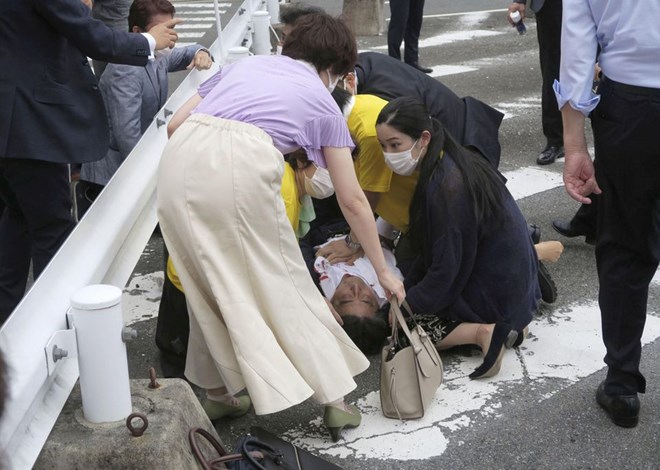
Friday July 8, 2022
 Former Japanese prime minister Shinzo Abe lies on the ground after apparent shooting during an election campaign for the July 10, 2022 Upper House election, in Nara, western Japan July 8, 2022. in this photo taken by Kyodo. Mandatory credit Kyodo via REUTERS
Former Japanese prime minister Shinzo Abe lies on the ground after apparent shooting during an election campaign for the July 10, 2022 Upper House election, in Nara, western Japan July 8, 2022. in this photo taken by Kyodo. Mandatory credit Kyodo via REUTERS
TOKYO, July 8 (Reuters) - Japanese former Prime Minister Shinzo Abe was shot on Friday while campaigning for a parliamentary election, with public broadcaster NHK saying a man armed with an apparently homemade gun opened fired at him from behind.
Police said a 41-year-old man suspected of carrying out the shooting in the western city of Nara had been arrested.
Kyodo news agency and NHK said Abe, 67, appeared to be in a state of cardiac arrest when airlifted to hospital, after having initially been conscious and responsive.
"Such an act of barbarity cannot be tolerated," Chief Cabinet Secretary Hirokazu Matsuno told reporters, adding that Abe had been shot at about 11:30 a.m. (0230 GMT).
He said he did not know Abe's condition.
NHK showed video of Abe making a campaign speech outside a train station when two shots rang out, after which the view was briefly obscured and then security officials were seen tackling a man on the ground. A puff of smoke behind Abe could be seen in another video shown in NHK.Kyodo published a photograph showing Abe lying face-up on the street by a guardrail, blood on his white shirt. People were crowded around him, one administering heart massage.
TBS Television reported that Abe had been shot on the left side of his chest and apparently also in the neck.
Political violence is rare in Japan, a country with strict gun regulations.
In 2007 the major of Nagasaki was shot and killed by a yakuza gangster. The head of the Japan Socialist Party was assassinated during a speech in 1960 by a right-wing youth with a samurai short sword.
"I thought it was firecrackers at first," one bystander told NHK.
Police identified the suspected shooter as Tetsuya Yamagami, a resident of Nara. Media said he had served in Japan's military.
Abe served two terms as prime minister to become Japan's longest-serving premier before stepping down in 2020 citing ill health.
But he has remained a dominant presence over the ruling Liberal Democratic Party (LDP), controlling one of its major factions.
His protege, Prime Minister Fumio Kishida, goes into Sunday's upper house election hoping, analysts say, to emerge from Abe's shadow and define his premiership.
Kishida suspended his election campaign after Abe's shooting and was returning to Tokyo where he was due to speak to media at 0530 GMT.
The government said there was no plan to postpone the election but most major parties stopped their campaigns.
'VERY SAD'
U.S. Secretary of State Antony Blinken expressed deep concern over Abe's condition.
"Our thoughts, our prayers are with him, with his family, with the people of Japan," Blinken said on the sidelines of a G20 meeting on the Indonesian island of Bali. "This is a very, very sad moment. And we're awaiting news from Japan."
The United States is Japan's most important ally.
The yen rose and Japan's Nikkei index (.N225) fell on news of the shooting, partially driven by a knee-jerk flight to safety.
Abe is best known for his “Abenomics” policy of aggressive monetary easing and fiscal spending.
He also bolstered defence spending after years of declines and expanded the military’s ability to project power abroad.
In a historic shift in 2014, his government reinterpreted the postwar, pacifist constitution to allow troops to fight overseas for the first time since World War Two.
The following year, legislation ended a ban on exercising the right of collective self-defence, or defending a friendly country under attack.
Abe, however, did not achieve his long-held goal of revising the U.S.-drafted constitution by writing the Self-Defense Forces, as Japan’s military in known, into the pacifist Article 9.
He was instrumental in winning the 2020 Olympics for Tokyo, cherishing a wish to preside over the Games, which were postponed by a year to 2021 because of the COVID-19 pandemic.
Abe first took office in 2006 as Japan’s youngest prime minister since World War Two. After a year plagued by political scandals, voter outrage at lost pension records, and an election drubbing for his ruling party, Abe quit citing ill health.
He became prime minister again in 2012.
Abe hails from a wealthy political family that included a foreign minister father and a grandfather who served as premier.
First elected to parliament in 1993 after his father's death, Abe rose to national fame by adopting a tough stance toward unpredictable neighbour North Korea in a feud over Japanese citizens kidnapped by Pyongyang decades ago.
Though Abe also sought to improve ties with China and South Korea, where bitter wartime memories run deep, he riled both neighbours in 2013 by visiting Tokyo's Yasukuni Shrine, seen by Beijing and Seoul as a symbol of Japan's past militarism.
Reporting by Chang-Ran Kim; Writng by Robert Birsel; Editing by Christian Schmollinger and William Mallard